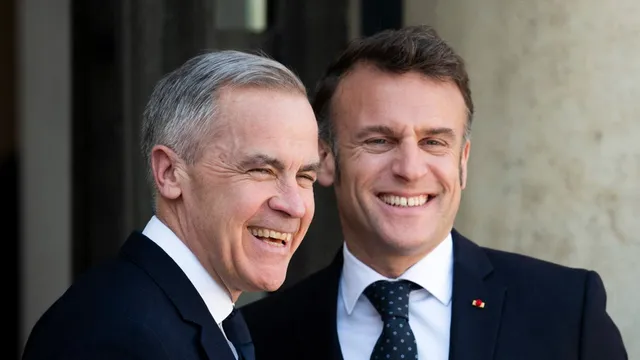
Mark Carney seeks European alliances amid Trump’s attacks on Canada
2025-03-17 13:20- Mark Carney embarked on his first international trip to Paris and London to build alliances amid conflicts with the U.S.
- Carney's meetings with European leaders aim to address the impacts of U.S. tariffs and Trump's remarks about Canadian sovereignty.
- The trip emphasizes Canada’s historic ties with France and the U.K. while asserting its unique identity distinct from the U.S.
Express your sentiment!
Insights
On March 17, 2025, Canadian Prime Minister Mark Carney began his inaugural international trip by arriving in Paris. His visit is focused on seeking diplomatic support from European allies in response to ongoing tensions with the United States, specifically related to President Donald Trump's policies that threaten Canadian sovereignty and economy. Carney is notably meeting with French President Emmanuel Macron, followed by talks in London with U.K. Prime Minister Keir Starmer and King Charles III, which underscores Canada's historical ties to these nations from its foundation. During his swearing-in ceremony, Carney highlighted Canada's unique identity derived from its French, English, and Indigenous roots, asserting its distinct difference from the United States. Since Trump's administration commenced, Canada has faced significant economic challenges, including steep tariffs on steel and aluminum. Trump's controversial remarks, including suggestions about Canada becoming the 51st state, have prompted serious backlash from Canadians, many of whom are currently boycotting American products. As part of his trip, Carney aims to reaffirm partnerships that are essential for Canada’s economic stability, especially as over 75% of Canadian exports go to the U.S. Discussions about diversifying trade are critical, emphasizing the necessity of strengthening alliances in response to U.S. trade policies that threaten Canada's economic future. Furthermore, Carney plans to address Arctic security concerns amid increasing geopolitical tensions, including those with Russia. The timing of Carney's trip is simultaneous with upcoming federal elections in Canada, indicating his intention to solidify his leadership both internationally and domestically. His government is also considering the implications of U.S. policies on defense matters, specifically regarding the purchase of American F-35 fighter jets, all influenced by the current administration's aggressive trade stance. Carney's government looks to unite with European allies to present a cohesive front in the face of adversity from the U.S.
Contexts
The history of Canada’s relations with the United Kingdom and France is a complex narrative shaped by exploration, colonization, and evolving national identities. The early 17th century marked the beginning of permanent European settlement in Canada, largely initiated by the French. Samuel de Champlain's establishment of Quebec in 1608 laid the groundwork for New France, which became a significant center of French colonial power in North America. Conversely, the British established their presence later through the establishment of colonies in what are now Nova Scotia and Newfoundland, leading to a series of conflicts and power struggles between the two colonial powers. The rivalry came to a head in the mid-18th century, particularly during the Seven Years’ War (1756-1763), which culminated in British victory and the subsequent Treaty of Paris, resulting in France ceding most of its territories in North America to Britain. This shift marked a pivotal point in the relationship between Canada and its two founding nations, as it set the stage for a British-dominated future while significantly diminishing French influence. Following the British ascendance in North America, the relationship between Canada and the United Kingdom became characterized by gradual political evolution. The British North America Act of 1867 established the Dominion of Canada, which began its journey toward self-governance while still retaining ties to Britain. The aftermath of the First World War and the Statute of Westminster in 1931 further solidified Canada’s legislative independence, allowing for a burgeoning sense of national identity that was initially tied to British roots. Despite this growing autonomy, the sense of loyalty to the monarchy remained a significant aspect of Canadian identity. Thus, Canada was able to cultivate its relationship with the United Kingdom into one defined by cooperation and mutual respect, even as it sought greater independence. The historical narrative of Canada and France has seen a resurgence since the early 20th century, particularly in the post-World War II era as Canada sought to reaffirm its multicultural identity and celebrate its French heritage. With a significant portion of Quebec's population being of French descent, the relationship has evolved from one of colonial dominance to one of cultural and linguistic partnership. The Quiet Revolution in the 1960s in Quebec brought about a revitalization of French language and culture, influencing Canadian policy and strengthening ties with France. Diplomatic relations grew, leading to various agreements in trade, culture, and education, reflecting a commitment to preserving the French heritage within Canada while fostering ties with France. In contemporary times, Canada maintains a robust diplomatic relationship with both the United Kingdom and France. This is evidenced by shared values in democracy, human rights, and multilateral cooperation on global issues. Canada's membership in international organizations such as the Commonwealth, which includes the UK, and strong bilateral relations with France showcase its diplomatic strategy of balancing historical ties with a modern global identity. The interplay of these relationships contributes to Canada’s unique position as a nation that honors its colonial past while embracing a diverse and inclusive future, navigating its role in a globalized world.